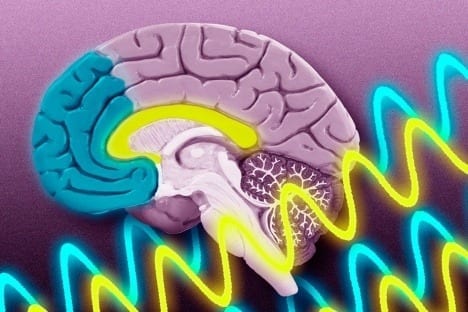
A closed-loop acoustic stimulation brainwave technology significantly reduced symptoms in people suffering from post-traumatic stress in a small pilot study conducted at Wake Forest Baptist Medical Center. The study is published in the April 19 online edition of the journal BMC Psychiatry.
“The effects of chronic stress are killing people and the medical profession has not yet found an answer for how best to treat them,” said Charles H. Tegeler, M.D., professor of neurology at Wake Forest School of Medicine, a part of Wake Forest Baptist. “We believe there is a need for effective, non-invasive, non-drug therapies for symptoms of post-traumatic stress, which is why we conducted this trial.”
Nineteen volunteers who reported high scores on the Post-traumatic Stress Disorder Checklist, civilian version (PCL-C), a commonly used symptom inventory, were included in this single-site study. Of those, 18 completed an average of 16 sessions over a total of 16.5 days, with eight days of actual visits to the office, Tegeler said.
The intervention, high-resolution, relational, resonance-based, electroencephalic mirroring (HIRREM), focused on the brain, which is the organ of central command for managing responses to threat and trauma. Participants received a series of HIRREM sessions in which brain electrical activity was monitored with scalp sensors, and software algorithms translated selected brain frequencies into audible tones in real time. Those tones were reflected back to participants via ear buds in as little as four milliseconds, providing the brain an opportunity for self-optimization of its electrical pattern.
As a closed-loop neurotechnology, the process did not require any conscious, cognitive activity by the participant, who merely relaxed and listened to the tones.
“It’s as if the brain can look at itself in an acoustic mirror, recalibrate its patterns towards improved balance and reduced hyperarousal, and can relax,” Tegeler said. HIRREM was developed by Brain State Technologies based in Scottsdale, Arizona, and has been licensed to Wake Forest Baptist for collaborative research since 2011.
Participants completed the PCL-C, and 12 also had continuous recording of blood pressure and heart rate, before and after the intervention sessions. Changes in asymmetry of temporal lobe high frequency brain electrical activity was analyzed from baseline assessment through the first four sessions, and again for the last four sessions. Autonomic cardiovascular regulation was evaluated using measures of heart rate variability and blood pressure modulation before and after the intervention.
After the sessions, 89 percent (16 of 18) of the participants reported clinically meaningful decreases in symptoms of post-traumatic stress as indicated by a change of at least 10 points from their baseline PCL-C score, Tegeler said. In the entire study group, the average reduction in the PCL-C score was 24 points. There were no adverse events reported.
There is ample scientific evidence that there is some brain pattern asymmetry associated with chronic stress. This study is important because it also showed that there was improved balance in brain pattern activity and significant improvement in the autonomic nervous system function, as measured by heart rate variability and blood pressure modulation. All are relevant to a state of chronic stress, which now seems to affect so many people, Tegeler said.
Study limitations included the case series design and the absence of a control group. Additionally, participants were selected based on self-reported symptoms and on the PCL-C score rather than a formal clinical assessment.
Learn more: Reduction of Post -Traumatic Stress Symptoms Associated with Non-invasive Neurotechnology
[osd_subscribe categories=’ptsd’ placeholder=’Email Address’ button_text=’Subscribe Now for any new posts on the topic “PTSD’]
The Latest on: Closed-loop acoustic stimulation brainwave technology
[google_news title=”” keyword=”closed-loop acoustic stimulation brainwave technology” num_posts=”5″ blurb_length=”0″ show_thumb=”left”]- Medtronic wins FDA approval for Inceptiv closed-loop spinal cord stimulator
Saluda Medical received FDA approval for a closed-loop device in 2022 but the big, publicly traded SCS companies have only provided open-loop systems. Medtronic said it will launch Inceptiv in the U.S ...
- Medtronic snags FDA approval for body-sensing, closed-loop spinal cord stimulator
Medtronic has secured FDA approval for its first closed-loop spinal cord stimulator, designed to take in signals from the body and adjust its therapy automatically. | The Inceptiv implant for chronic ...
- FDA approves Medtronic’s Inceptiv closed-loop rechargeable spinal cord stimulator
Inceptiv treats chronic pain and represents Medtronic’s first SCS device to offer a closed-loop feature. This feature senses each person’s unique biological signals, adjusting stimulation ...
- Medtronic receives FDA approval for Inceptiv™ closed-loop spinal cord stimulator
Closed-loop sensing capability instantly and automatically adjusts therapy while treating chronic pain ...
via Google News and Bing News










